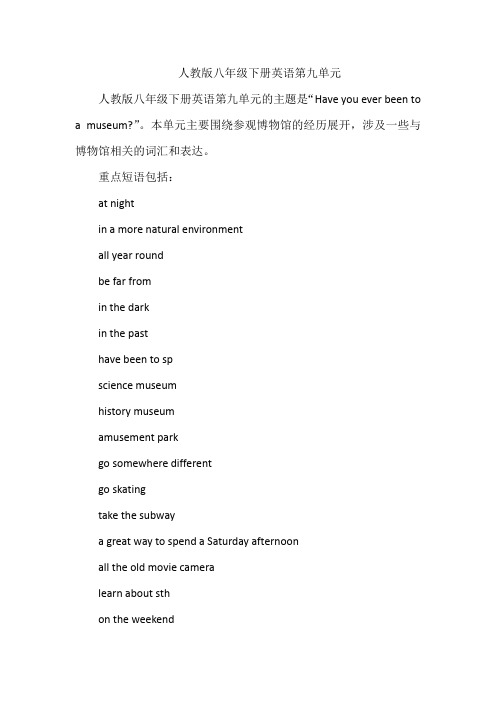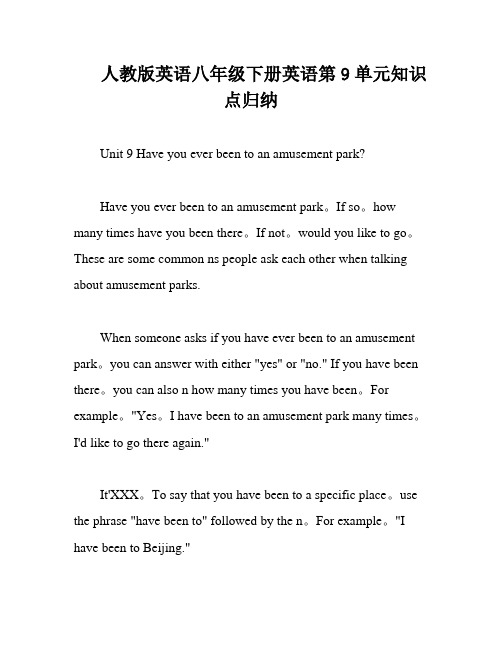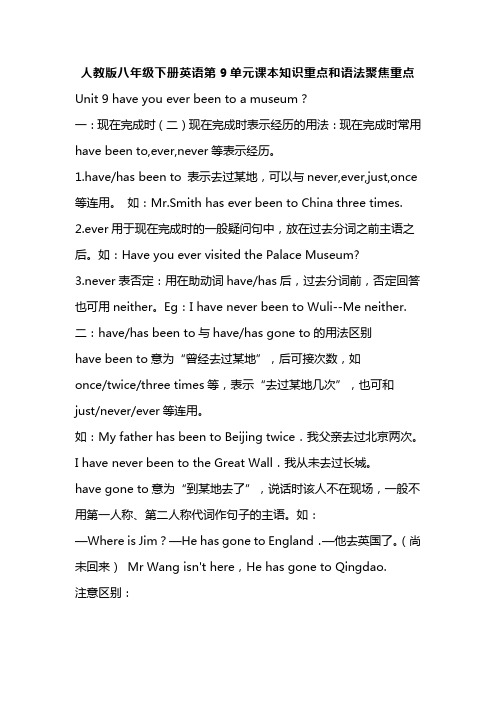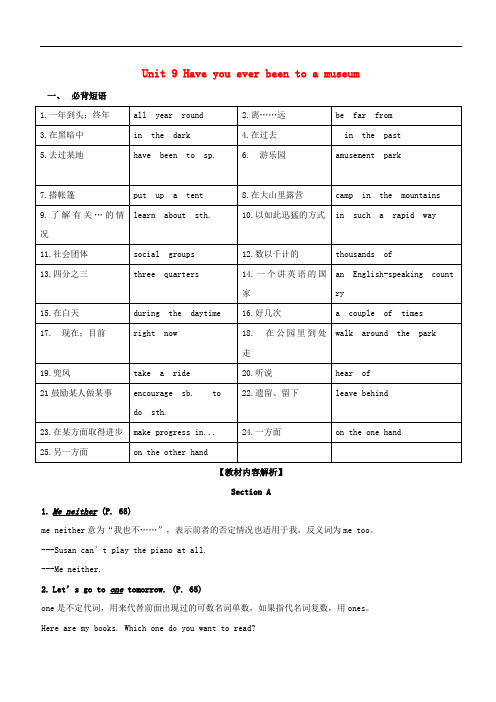新人教版八年级英语下册复习短语笔记资料Unit 9 Have you ever been to a museum中文
人教版八年级下册英语第九单元

人教版八年级下册英语第九单元人教版八年级下册英语第九单元的主题是“Have you ever been to a museum?”。
本单元主要围绕参观博物馆的经历展开,涉及一些与博物馆相关的词汇和表达。
重点短语包括:at nightin a more natural environmentall year roundbe far fromin the darkin the pasthave been to spscience museumhistory museumamusement parkgo somewhere differentgo skatingtake the subwaya great way to spend a Saturday afternoonall the old movie cameralearn about sthon the weekendcamp in the mountainsput up a tentin such a rapid waydifferent kinds ofdevelopment of toiletssocial groupsthe tea art performancesmake a perfect cup of tea with beautiful tea sets a nice place to enjoy teathousands ofinternational Museum of Toiletsthe Terracotta Armysoutheast Asianight Safarithree quartersan English-speaking countryhave a problem doing sthduring the daytimea couple of timesright nowan amusement park with a special themeWalk around the parkhear oftake a rideanother provincethe Bird’s Nestencourage sb to do sthon the one hand....on the other hand重点句型包括:Have you ever been to a science museum?Grammar Focus 句子1Have you ever visited the space museum?分数词的表达法whether的用法本单元还涉及一些语法知识,如现在完成时、过去进行时、现在进行时、一般过去时等。
新人教版英语八下unit9必背词组及句子

新人教版八年级下u nit 9 必背词组及句子2. No, I ’v e never been to a science museum. 不,我从没有去必背词组过科学博物馆。
1. have a great time 过得愉快 3. Have you ever visited the space museum? 你曾经参观过2. go skating/ boating/ shopping/ swimming?太空博物馆吗去滑冰/ 划船/购物/游泳4. No, I ’v e never been there. 不,我从没去过那儿。
3. put up a tent 搭帐篷必背句子4. a very unusual museum 一个不寻常的博物馆 1. I learned about the inventions that led to color movies,5. encourage somebody to do something 鼓励某人too. 我还了解了一些发明,它们成就了彩色电影。
做某事 2. The most interesting museum I v’e ever been to is the6. a relaxing and peaceful place 一个令人放松并且American Computer Museum. 我曾经参观过的最有趣的宁静的地方博物馆是美国计算机博物馆。
7. tea art performances 茶艺表演3. It ’s unbelievable that technology has progressed in such a8. make a perfect cup of tea 沏一杯完美的茶rapid way! 技术以如此迅速的方式进步真是令人难以置9. a couple of times 两次信。
10. a boat ride 乘船(名词短语)4. I wonder how much more computers will be able to do in11. take a ride on the boat 乘船(动词短语)t he future. 我想知道,未来计算机还能做多少工作呢。
人教版八年级下册英语第九单元知识点归纳总结

Unit9 Haveyoueverbeentoamuseum?一、词汇与短语◆重点单词A 局部1.amusement 消遣;玩耍n. 3.somewhere 在某处;到某处adv. 5.camera 照相机;摄影机;摄像机n. 7.invention 制造;制造物n. 9.invent 制造;制造v.2.social 社会的adj.4.peaceful 和平的;清静的adj. 6.performance 表演;演出n. 8.perfect 完善的;完全的adj. 10.itself (it 的反身代词)它自己pron.11.unbelievable 难以置信的;不真实的adj. 12.collect 收集;采集v.13.progress 进步;进展v.&n. 15.rapid 快速的;快速的adj. 17.unusual 特别的;不寻常的adj. 19.toilet 坐便器;厕所n. 14.theme 主题n.16.ride 供乘骑的游乐设施;短途旅程n. 18.province 省份n.20.encourage 鼓舞v.21.German 德国的;德语的;德国人的adj. 德语;德国人n.B 局部1.thousand 一千num. 3.safe 安全的;无危急的adj. 5.simply 仅仅;只;不过adj. 7.fear 几可怕;惧怕v.&n. 9.Indian 印度的adj. 印度人n. 2.fox 狐狸n.4.equator 赤道n. 6.spring 春天n. 8.mostly 主要地;通常adv. 10.location 地点;位置n.11.whether 不管……(还是);或者……(或者);是否conj. 12.Japanese 日本的;日本人的;日语的adj. 日本人;日语n. 13.whenever 在任何……的时候;无论何时conj.◆重点短语A 局部1.amusementpark 游乐场3.teaart 茶艺5.acoupleof 两个;一对;几个7.ahistorymuseum 历史博物馆9.aspacemuseum 太空博物馆11.anartmuseum 艺术博物馆13.awaterpark 水上公园2.learnabout 了解4.leadto 导致6.campinthemountains 在山中宿营8.putupatent 搭帐篷10.haveinformationabout 有关于……的信息12.progressinsucharapidway 进步如此快速14.acoupleoftimes 几次15.inthefuture 在将来17.haveagreattime 过得开心19.afilmmuseum 电影博物馆16.encouragesb.todosth. 鼓舞某人做某事18.somewheredifferent 某个不同的地方20.theteaartperformance 茶艺表演21.takearideontheboatforseveraldays 乘船旅行几天22.thehistoryanddevelopmentof…................. 的历史和进展B 局部1.allyearround 全年3.alotofthetime 大局部时间5.outsideofChina 在中国以外7.duringthedaytime 在白天9.becloseto 靠近;接近11.choosetodosth. 选择做某事2.thousandsof 数以千计的;许很多多的4.inthedark 在黑暗中6.anEnglish -speakingcountry 一个说英语的国家8.haveproblemsdoingsth. 做某事有困难10.thebesttimetodosth. 做某事的最好时间12.befarfrom 远离13.threequartersofthepopulation 人口的四分之三14.ontheonehand ……ontheotherhand ……一方面……另一方面……◆重点句子A 局部1.—Have youever beento thespacemuseum? —你曾去过太空博物馆吗?—Yes,Ihave.Howaboutyou? —是的,我去过。
人教英语八年级下册 9单元知识点笔记

Unit 9 Have you ever been to a museum?1.现在完成时态:(8单元现在完成时态(一))1.含义:表示过去发生或已经完成的某一动作对现在造成的影响或结果;或是表示过去的动作或状态从过去一直持续到现在一段时间。
2.结构:have/has+V过去分词3.肯定句:主语+have/has+V过去分词+…….否定句:主语+haven’t/ hasn’t+V过去分词……一般疑问句:Have/Has+主语+V过去分词+…….?肯定回答:Yes,主语对应的人称代词+have/has.否定回答:No,主语对应的人称代词+haven’t/ hasn’t.注意:变一般疑问句或否定句时,already要改为yet.4.常用时间标志词:already, yet, ever, never, since, for+段时间,sofar, up to now, 次数,recently, 等。
5.(9单元现在完成时态(二)):have been to….去过某地(已回,多与次数,ever, never连用)have gone to…..去了某地(未回)have been in….在某地(待了多久,多与延续时间状语连用)注意:当介词后面的地点为副词性地点时,介词要省略。
如:I have been there for a year.(省略的in) 我在那儿已经待了一年了。
I have been home. (省略的to) 我已经回家了。
6.(10单元:现在完成时态(三))现在完成时后有延续性时间状语,则非延续性动词要改为延续性动词。
如:marry-----be marriedBegin---be on end/ finish------be overDie----be deadLeave sp.----be away from sp.Get up----be upReach/come/go/move to/get to sp------be in/ at sp.Return to-----be back to go out-----be outBorrow------keepBuy-----havePut on---wear.Join-----be inBecome---beFall asleep-----be asleep7.现在完成时态,for+段时间= since+段时间+ago.2.invent, 动词,发明;invention, 名词,发明inventor名词;发明家Edison is a great inventor. He invented many inventions.3.German德国人;德语;德国的;德国人的;德语的Germany 德国4.thousand的用法:数字+thousand, 没有数字用thousands of…(类似单词:hundred, million, billion)例如:I have ten thousand books. 我有一万本书。
2022人教版初中英语八年级下册Unit9重点知识点归纳总结(复习必背)

2022年春人教版八年级英语单元重点知识点归纳八年级下册Unit9 Have you ever been to a museum?一、四会单词(详见P124)camera,unbelievable ,progress,rapid,unusual,toilet,encourage,social,peaceful,perfect,itself,collect,German,ride,province,thousand,safe,simply,fear,whether,Indian,Japanese,fox,whenever,spring,mostly二、重点词组与句子Section Athe film/space/ history/art/ science museum 电影/太空/ 历史/艺术/科技博物a water/ amusement park 水上公园/游乐园camp in mountains在山上露营have been to 曾去过have never been to 从未去过take the subway 搭乘地铁put up a tent 搭建帐篷go somewhere interesting 去某个有趣的地方go somewhere different 去某个不同的地方Hubei province 湖北省social groups 社会团体collect tea sets收集茶具 a tea art performance 茶艺表演some Germans 一些德国人 a perfect plan 一个完美计划peaceful places near a lake 湖边宁静的地方an unusual museum 一座不同寻常的博物馆an amusement with a theme park一个有特殊主题的游乐场encourage sb. to do sth. 鼓励某人做某事 a relaxing and peaceful place 一个令人放松和安宁的地方 a couple of times 几次exciting rides 游乐设施fantastic gift shops 极好的礼品店have a great /good / wonderful / nice time = have fun = enjoy oneself过得很愉快。
人教版英语八年级下册英语第9单元知识点归纳

人教版英语八年级下册英语第9单元知识点归纳Unit 9 Have you ever been to an amusement park?Have you ever been to an amusement park。
If so。
how many times have you been there。
If not。
would you like to go。
These are some common ns people ask each other when talking about amusement parks.When someone asks if you have ever been to an amusement park。
you can answer with either "yes" or "no." If you have been there。
you can also n how many times you have been。
For example。
"Yes。
I have been to an amusement park many times。
I'd like to go there again."It'XXX。
To say that you have been to a specific place。
use the phrase "have been to" followed by the n。
For example。
"I have been to Beijing."It'XXX een "have been to" and "have gone to." "Have been to" indicates that you have been to a place and returned。
人教版英语八年级下册英语第9单元知识点归纳

Unit9 Have you ever been to an amusement park?1. —Have you ever been to…? ---你曾经去过游乐园吗?—Yes,I have. / No,I haven’t. ---是的,去过。
/不,没去过。
I/He/She have / has never been to…我/他/她从没去过……I/He/She have / has been to… many times. 我/他/她去过...…很多次。
I’d like to go there again. 我还想再去一次。
2. — Have you ever been to an amusement park? ---你曾经去过游乐园吗?— Yes,I have. / No,I haven’t. ---是的,去过。
/不,没去过。
点拨1have been to+地点去过某地I have been to Beijing. 我去过北京。
辨析:have been to+sp.与have gone to +sp.①have been to +sp., 表示去过某处,现在已经回来了,不在那里了。
We have been to Qingdao. 我们去过青岛。
(现在不在青岛)②have gone to +sp., 表示到某处去了,现在还没有回来。
They have gone to Sydney. 他们去悉尼了。
(现在在悉尼或在途中)③have been in +sp., 表示在某处呆过多长时间。
How long have you been in China? 你在中国住了多长时间?3. neither, nor用法相同,都用于否定的倒装,意为“也不”。
so用于肯定的倒装。
意为“也”。
①否定句+neither/nor+be(have, 助动词或情态动词)+另一主语,表示“也不”。
If you won’t go, neither will I. 如果你不去,我也不去。
人教版新目标初中英语八年级下册Unit9学霸笔记

Unit9 Have you ever been to a museum? 【词汇解析】amusement [ˌəˈmju:zmənt] n. 娱乐,游戏amusement park 游乐场space museum 太空博物馆history museum 历史博物馆water park 水上乐园somewhere [ˈsʌmweə] adv. 某处,在某处camera [ˈkæmərə] n. 照相机invention [ɪnˈvenʃn] n. 发明,创造invent [inˈvent] v. 发明,创造unbelievable [ˌʌnbɪˈli:vəbl] adj. 难以置信的, It’s unbelievable that....很难相信......progress [ˈprəʊɡres] n. 进步,进展make great/ good progress in 在……取得大的进步rapid [ˈræpɪd] adj. 迅速的,快速的in such a rapid way 以如此迅猛的方式unusual [ˌʌnˈju:ʒuəl] adj. 特别的,不寻常的toilet [ˈtɔɪlət] n. 坐便器,厕所encourage [inˈkʌridʒ] v. 鼓励,激励1.encourage sb to do sth 鼓励某人做某事social [ˈsəuʃəl] adj. 社会的social groups 社会团体peaceful [ˈpi:sful] adj. 和平的,平静的peace n. 和平tea art 茶艺tea set 茶具the tea art performances茶艺表演performance [pəˈfɔ:məns] n. 表演,演出perfect [ˈpɜ:fɪkt] adj. 完美的,理想的,完全的itself [itˈself] pron. 它自己,它本身collect [kəˈlekt] v. 收集collect tea sets 收集茶具a couple of 一对,两个,几个German [ˈdʒɜ:mən] n. & adj. 德语,德国人(的)theme [θi:m] n. 题目,主题,作文the theme of……的主题/题目ride [raɪd] n. & v. 骑,乘;(短途)旅程take a ride 兜风province ['prɒvɪns] n. 省,省份thousand [ˈθaʊznd] num. 一千thousands of 数以千计的,许许多多的safe [seif] adj. 安全的,保险的simply [ˈsimpli] adv. 仅仅,只,不过fear [fiə] n. & v. 恐惧,害怕whether [ˈweðə(r)] conj.不管…还是,是否whether =if 引导宾语从句(是否)Indian [ˈɪndjən] adj. 印度的,印度人的Japanese [ˌdʒæpəˈni:z] n. & adj. 日本人,日语;日本的fox [fɒks] n. 狐狸all year around 全年equator [iˈkweitə] n. 赤道whenever [wenˈevə] conj. 无论何时spring [spriŋ] n. 春天mostly [ˈməustli] adv. 大多数地,主要地,通常location [ləʊˈkeɪʃn] n. 地点,位置on the one hand... on the other hand 一方面……另一方面重点句型1. a great way to do sth. 一个做某事的好方法the best time to do sth. 做某事的最佳时间think about ways to do sth. 想出做某事的办法2. watch(观看)see (看见)sb. do sth.某人做了某事notice(注意到)hear(听到)sb. doing sth.某人正在做某事3. have problem (in)doing sth. 做某事很费劲4. learn about sth.了解某事5.choose to do sth. 选择做某事✿本单元重点✿(现在完成时Ⅱ)【特殊用法】1.短暂性动词转换为延续性动词和段时间连用.arrive→be here begin(start)→be on go out →be outdie →be dead buy/get →have come back→be back leave →be away (from) join →be in marry →be married borrow/lend →keep put on →wear 或be on get up→be upfinish →be over2.辨析have been to ,have gone to & have been inhave been to +地点曾经去过某地人回来了,现在在说话的地方have gone to+地点已经去了某地人还没回来have been in+地点+段时间在某地待一段时间3.国家---人---语言国家adj. 人中国China Chinese Chinese日本Japan Japanese Japanese美国America American American 加拿大Canada Canadian Canadian 印度India Indian Indian澳大利亚Australia Australian Australian 意大利Italy Italian Italian俄国Russia Russian Russian韩国Korea Korean Korean国家adj. 人墨西哥Mexico Mexican Mexican德国Germany German German罗马Rome Roman Roman埃及Egypt Egyptian Egyptian英国Britain British British英格兰England English Englishman/woman 法国France French Fenchman/woman 希腊Greece Greek Greek泰国Thailand Thai the Thai中国日本单复同,英国法国man变men,其他全部加s1。
人教版八年级下册英语第9单元课本知识重点和语法聚焦重点

人教版八年级下册英语第9单元课本知识重点和语法聚焦重点Unit 9 have you ever been to a museum?一:现在完成时(二)现在完成时表示经历的用法:现在完成时常用have been to,ever,never等表示经历。
1.have/has been to 表示去过某地,可以与never,ever,just,once 等连用。
如:Mr.Smith has ever been to China three times.2.ever用于现在完成时的一般疑问句中,放在过去分词之前主语之后。
如:Have you ever visited the Palace Museum?3.never表否定:用在助动词have/has后,过去分词前,否定回答也可用neither。
Eg:I have never been to Wuli--Me neither. 二:have/has been to与have/has gone to的用法区别have been to意为“曾经去过某地”,后可接次数,如once/twice/three times等,表示“去过某地几次”,也可和just/never/ever等连用。
如:My father has been to Beijing twice.我父亲去过北京两次。
I have never been to the Great Wall.我从未去过长城。
have gone to意为“到某地去了”,说话时该人不在现场,一般不用第一人称、第二人称代词作句子的主语。
如:—Where is Jim?—He has gone to England.—他去英国了。
(尚未回来)Mr Wang isn't here,He has gone to Qingdao.注意区别:he went to Ankang last week(一般过去时)上周他(做了一件事,那就是)去了安康He has been to Ankang(现在完成时)他去了安康他曾经到过安康(他现在回来了,人不在安康了)He has gone to Ankang(现在完成时)他去了安康(也许刚出发,也许已经在安康,反正人现在不在这里)He has been in Ankang for years(现在完成时)他呆在安康已经十年了(现在还在安康呆着呢)知识点:1.Me neither. Let’s go to one tomorrow. :neither用作副词, 意为“也不”, 常用于句首, 如Me neither(=Neither have I),表示前面否定的内容也适合于另一个人或物。
人教版八年级英语下册Unit9知识点归纳

Unit9 Have you ever been to a museu知m?识点归纳一、重点短语1.at nigh在t 夜晚2.in a more naturalenvironment在一个更加自然的环境中3.all year rou一nd年到头;终年25.make a perfectcup of t eawith b eautiful t ea set用s秀丽的茶具沏一杯完善的茶26.a nice place to enjoy一t个e a品茶的好地方4. be far fro离m……远27. thousands of数以千计的5.in the dar在k 黑暗中6.in the pas在t 过去7.have been to s去p.过某地8.science museum科学博物馆28.International Museum of Toi国l e际t s厕所博物馆29.the Terracotta Arm兵y 马俑30.Southeast Asi东a 南亚9. history museum历史博物馆31. Night Safar夜i间动物园10.amusement park游乐园11.go somewhere differen去t不同的地方12.go skating去滑冰13.take the subwa坐y地铁32.three quarte四r s分之三33.an English-speakinc g ountry一个讲英语的国家34.have problem doing s t做h.某事很困难14.a great way to spend a Saturday afterno3o5n. during the dayti在me白天一个过周六下午的好方法15.allthe o ld m ovie cameras全部的古老的电影摄影机16.learn about s解t h有. 关。
的状况17.on the weekend在周末18.camp in the mountain在s大山里露营19.put up a t e搭n t帐篷20.in such a rapid w以ay如此迅猛的方式21.different kinds各o种f 各样的36.a couple of tim好es几次37.right now现在;目前38.an a musement park w ith a s pecialtheme 一个有特别的主题的游乐园39.walk around the pa在r k公园里处处走40.hear of听说41.take a ri兜d e风42.another provin另c e一个省43.the Bird’s N鸟es巢t22. development of toil厕e t所s的进展44. encourage sb. to do鼓s励t h某.人做某事23. social group社s 会团体45. on the one hand... on the other一h方and.24. the tea art performa茶nc艺es表演面,另一方面二、用法归纳1.a great way to do sth 一个做某事的好方法2.watch sb to do sth 观看某人做了某事3.It’sunbelievable that....很难信任......4.e ncourage sb to do sth 鼓舞某人做某事5.have problem (in〕doing sth 做某事很费力6.a s...as.. 和 .. 一样7.t he best time to do sth 做某事的最正确时间8.c hoose to do sth 选择做某事9.tell sb to do sth 告知某人做某事三、重点句型1.Have you ever been to. .. ?Have you ever been to a science museum?你曾经去过科学博物馆吗?2.Let’s…Let’s go somewhere different today.我们今日去个不同的地方吧。
八年级英语下册Unit9Haveyoueverbeentoamuseum短语语法知识点汇总人教版

Unit 9 Have you ever been to a museum 一、必背短语【教材内容解析】Section A1.Me neither (P. 65)me neither意为“我也不……”,表示前者的否定情况也适用于我,反义词为me too。
---Susan can’t play the piano at all.---Me neither.2.Let’s go to one tomorrow. (P. 65)one是不定代词,用来代替前面出现过的可数名词单数,如果指代名词复数,用ones。
Here are my books. Which one do you want to read?---I don’t like these dresses.---How about those ones over there.3.Let’s go somewhere different today. (P. 65)somewhere用作副词,表示“在某处、到某处”,常用于肯定句中,在否定句和疑问句中用anywhere。
It’s cold here. Let’s go somewhere else.Did you go anywhere last Sunday?4.They are going to take the subway. (P. 66)take the subway意为“乘地铁”,take用作动词,可以表示“乘、坐(车、船等)”。
We take the subway to work every day.5.It’s a great way to spend a Saturday afternoon. (P. 66)(1) way表示“方法”时,后常接动词不定式或者of doing作定语。
Can you think out a way to open the door/of opening the door?(2) spend的用法① sb. spend+时间/金钱+on sth. “在某事上花费多长时间或者多少钱”The man spent the whole day on his speech.The family spent 10,000 dollars on their trip.② sb. spend+时间+(in) doing sth. “花费多长时间做某事”The boy has spent two hours playing the computer games.【拓展】辨析spend, pay, take和cost6.We put up a tent and cooked outside. (P. 66)put up意为“搭建”,还可以表示“举起、张贴”。
八年级英语下册Unit 9知识讲解

八年级英语下册Unit 9知识讲解Unit 9Have you ever been to an amuark?【单元目标】Ⅰ.单词与短语neither amusement discover especially attendant travel population chara fear type awake env temperature theme attraction route boardcruise boat southeast quarter brave excellent natural whenever season da have a great time 玩的愉快take a ride 兜风end up 结束on board 在船(飞机、火车)上exchange student 交换生take a holiday 休假;度假three quarters 四分之三all year round 一年到头;终年have…proble m(in) doing sth. 做某事遇到问题 be close to 接近,靠近/about doing sth. 考虑或打算做某事argue with sb. 与人争吵Ⅱ.目标句型:1. —Have you ever been to…?—Yes,I have. /No,I haven’t.2. I/He/She has / have never been to…3. Where have you been?4. Where do you want to go?5. How long have you been doing…?6. What do you like best about doing sth.?7. What kind of job do you want?8. How do/did you do sth.?9. How do you spell your name?Ⅲ.语法现在完成时A.表示过去发生或已经完成的动作对现在造成的影响或结果,或从过去已经开始,持续到现在的动作或状态。
八年级下册unit9知识点1

Unit 9 Have you ever been to a museum?课文重难点讲解1.—Have you ever been to a science museum?你曾经去过科学博物馆吗?⑴have/ has been to + 地名“曾经去过某地” , 现在已经回到原地。
⑵have gone to “已经去某地了” ,说话时该人不在现场。
⑶ have been in +地点待在某地,常与时间段搭配。
I have been in Shanghai for three years.2. Me neither我也没有。
【解析】在英语中,表示“也”的知识归纳如下:主语+ neitherA. 否定句中的“也” neither +助动词/be + 主语完整的否定句后加either,但要加逗号隔开。
3. Let’s go to one tomorrow. 咱们明天去一个看看吧!【解析】⑴ Let’s 中的us 包括对方,反意疑问句用shall weLet’s go and listen to the music, ____________?⑵ Let us 不包括对方, 反意疑问句用will youLet us wait for you in the reading room, ___________?⑶ Let sb. do sth 让某人做某事(sb.应用人称代词的宾格形式)5. It’s really interesting, isn’t it?【反意疑问句】6. 【解析1】invent v 发明→inventor n 发明家→ invention n 发明invent 发明指事物从无到有(客观上没有)discover 发现强调事物本身存在,只不过从“未知”到“已知”(客观上以前存在)【解析2】lead →led→ led v引导,引诱→ leader n领导人【拓展】lead to sth 导致……lead sb. to sw 引导某人去某地lead sb. to do sth 引导某人干某事7. take the/a +交通工具+to +地点“乘坐……” (放于句中) 动词短语在句中做谓语take the subway 乘地铁take the train 乘火车take the bus 乘公共汽车take the taxi 打的8. 【短语】:put away 把…收起来put on 穿上put up 张贴,put out 熄灭put…into… 把……放进put down 放下【解析】information信息;资料【辨析】information/message/ news⑴information指电视、电脑或其它杂志等获得的信息,为不可数名词;a piece of information 一条信息You can get much information on the Internet⑵. message“消息、口信、电报” 指书面、口头、无线电等传来的信息,为可数名词;I’ll leave a message for her. 我将为她留个口信。
- 1、下载文档前请自行甄别文档内容的完整性,平台不提供额外的编辑、内容补充、找答案等附加服务。
- 2、"仅部分预览"的文档,不可在线预览部分如存在完整性等问题,可反馈申请退款(可完整预览的文档不适用该条件!)。
- 3、如文档侵犯您的权益,请联系客服反馈,我们会尽快为您处理(人工客服工作时间:9:00-18:30)。
Unit 9 Have you ever been to a museum?
Section A
1. _______ ______科学博物馆
_____ ______太空博物馆
_______ ______历史博物馆
___ ______艺术博物馆
2. __ _________ ____ 游乐园
_ _____ / _____ ____水上/主题公园
3. ____ ___ ______ __ __. = __ __ __. __ ______
乘地铁去某地
__ _________ _________去某个不同的地方
____ _________ _________ 丢失某样重要东西
4. ____ / ___ ____ __ 曾经到过
____ / ___ ____ __ 已经去了
____ / ___ ____ __ 一直待在
5. __ ___ ____ ______ ____我们上次学校郊游时
____ _ ____ 旅行
__ __ _ ____去旅游
____ ____被......綷倒
6. _ _____ ___ __ __ ___.做某事的极好办法_ ____ _____ __ __ ___.一个做某事的好地方_ ____ _____ __ _____ ___ 一个品茶的好地方
_ _________ ___ ____ _____ __ ____ _ _______
一个极好而又安全的度假胜地
_ ____ _____ __ ________ ____ _______
练习英语的一个好地方7. _____ _____ 了解;知道
8. ____ __通向;导致
9. ____ __ ___ ________ 在山里扎营
__ _______去野营
___ __ _ ____搭起帐篷
10. ________ __…在......方面取得进展/进步
________ __ ___’_ _______ 学习上有进步
__ ________ 进行中
____ ________ __...在......取得进步/进展
____ _____ ________取得很大进步
____ _____ ________取得迅速进步
11. __ ____ _ _____ ___以如此迅速的方式
12. _________ __. __ __ ___.鼓励某人做某事
13. _______ ___.
改善某东西;改进某东西;提高某东西(指在好或不好的基础上进行修改,改进)
_______ _______提高英语水平
_______ _________ ______ 提高听力技能
_______ ______ 改善健康
_______ __...在......有所提高
_______ __ / ____...
在......上加以提高(指在好的基础上再进一步)14. _ ______ __ 两个;几个
_ ______ __ _____ 好几次
_ ______ __ ____ 一两天;几天
_ ______ __ _____ / ______ 几周/ 几个月15. ___ / ____ __ / _____ / ______ __. _____ ___.
看到/看/观察/注意某人在做某事
16. ____ _ ____ 兜风
____ __. _ ____ = ____ __. __ 让某人搭便车
____ _ ____ __ ___ ____ ___ _______ ____
乘船游览几天
17. ______ __ _______ ________ __ _____
去中国的另一个省旅游
____ ____ __ _______ ________ __ _____
去过中国的另一个省
Section B
18. _________ __数以千计的;许许多多的
_________ __ ________ ____ _____
来自中国数以千计的游客
_____ ________ ________ 三千个学生
___ __ _ ________千里挑一的;出众的
19. __ ___ ____... __ ___ _____ ____...
一方面......另一方面......
20. ____ ____ _____ ________ __ ___ __________ ___ _______
超过四分之三的人口是中国人
___ __________ __ _____ __...中国的人口是......
21. ____ _ _______ / ________ 度假
__ __ __. ___ ___’_ _______ = __ __ __. __ _______
到某地去度假
22. __ _______-________ _______
一个讲英语的国家
23. __ _________ ____ 在东南亚
_______ __ _____在中国以外
24. ____ ___. / __. = __ ______ __ ___. / __.
害怕某东西/某人
25. ____ ________ /_______ / __________ (__) _____ ___
做某事很费劲/有困难26. ____ _______看起来奇怪
27. ______ / __ ___ ___ 在白天
__ _____ = __ ___ _____ 在夜晚
___ ___ ___ ___ _____昼日昼夜;日日夜夜28. __ ______ = __ ________
睡着;在睡觉(强调状态)
____ ______入睡(强调动作)
29. ____ __ 醒来
____ __. __唤醒某人;把某人叫醒
__ _____醒着的(强调状态)
30. ___ ____ ____ __ __ ___.做某事的最佳时间
31. __ _ ____ _______ ___________
在一个更自然的环境里
32. ____ ___’_ ___________ 给某人量体温____ _ ___________ = ____ _ _____ 发烧
____ / ___ ___________ 高/ 低温
33. ___ ____ _____ 一年到头;终年
34. __ _____ __ / __ ____ __ 离......近
__ ___ ____ 离......远
35. __ ___ ____在黑暗中;秘密地
_____ ____天黑以后
______ ____天黑以前
___ / ____ ____ 黑起来
____ ____看起来阴暗
____ (___.) ____对(某事)保守秘密
_____ __. __ ___ ____不给某人知道
____ _____黑马(有本事而深藏不露的人)
____ ____深蓝色
36. __ ___ ____在过去(用于一般过去时)__ ___ ____ ___ _____
在过去几年里(用于现在完成时)。
